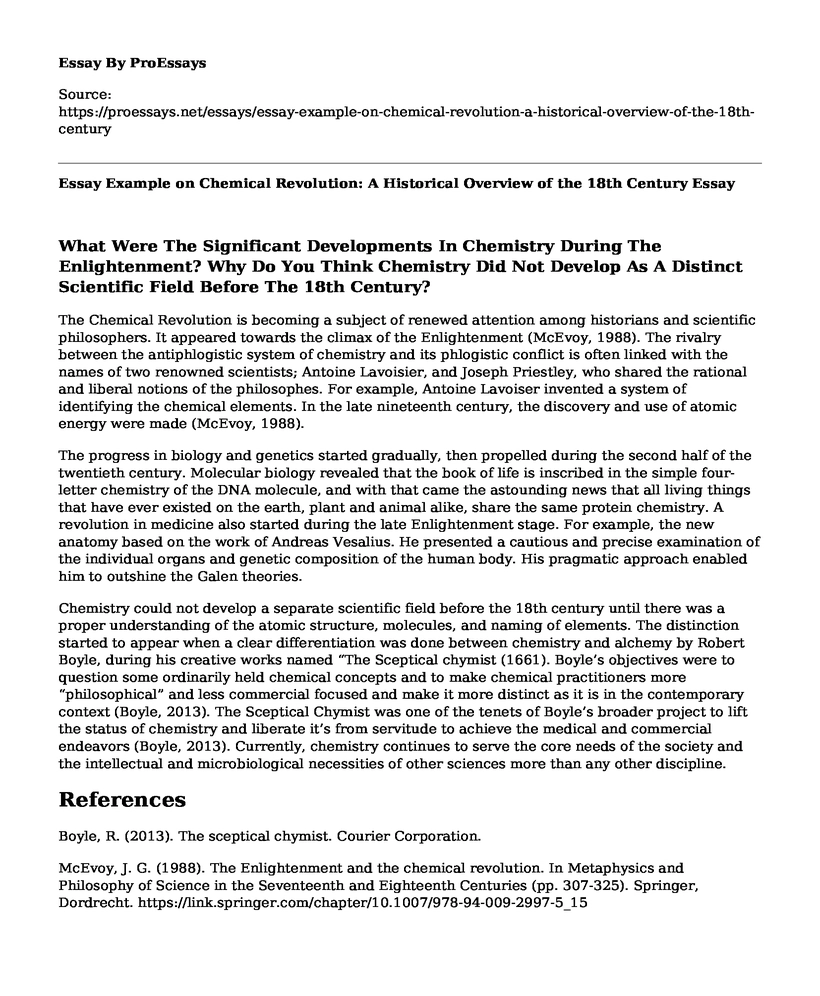What Were The Significant Developments In Chemistry During The Enlightenment? Why Do You Think Chemistry Did Not Develop As A Distinct Scientific Field Before The 18th Century?
The Chemical Revolution is becoming a subject of renewed attention among historians and scientific philosophers. It appeared towards the climax of the Enlightenment (McEvoy, 1988). The rivalry between the antiphlogistic system of chemistry and its phlogistic conflict is often linked with the names of two renowned scientists; Antoine Lavoisier, and Joseph Priestley, who shared the rational and liberal notions of the philosophes. For example, Antoine Lavoiser invented a system of identifying the chemical elements. In the late nineteenth century, the discovery and use of atomic energy were made (McEvoy, 1988).
The progress in biology and genetics started gradually, then propelled during the second half of the twentieth century. Molecular biology revealed that the book of life is inscribed in the simple four-letter chemistry of the DNA molecule, and with that came the astounding news that all living things that have ever existed on the earth, plant and animal alike, share the same protein chemistry. A revolution in medicine also started during the late Enlightenment stage. For example, the new anatomy based on the work of Andreas Vesalius. He presented a cautious and precise examination of the individual organs and genetic composition of the human body. His pragmatic approach enabled him to outshine the Galen theories.
Chemistry could not develop a separate scientific field before the 18th century until there was a proper understanding of the atomic structure, molecules, and naming of elements. The distinction started to appear when a clear differentiation was done between chemistry and alchemy by Robert Boyle, during his creative works named “The Sceptical chymist (1661). Boyle’s objectives were to question some ordinarily held chemical concepts and to make chemical practitioners more “philosophical” and less commercial focused and make it more distinct as it is in the contemporary context (Boyle, 2013). The Sceptical Chymist was one of the tenets of Boyle’s broader project to lift the status of chemistry and liberate it’s from servitude to achieve the medical and commercial endeavors (Boyle, 2013). Currently, chemistry continues to serve the core needs of the society and the intellectual and microbiological necessities of other sciences more than any other discipline.
References
Boyle, R. (2013). The sceptical chymist. Courier Corporation.
McEvoy, J. G. (1988). The Enlightenment and the chemical revolution. In Metaphysics and Philosophy of Science in the Seventeenth and Eighteenth Centuries (pp. 307-325). Springer, Dordrecht. https://link.springer.com/chapter/10.1007/978-94-009-2997-5_15
Cite this page
Essay Example on Chemical Revolution: A Historical Overview of the 18th Century. (2023, Aug 16). Retrieved from https://proessays.net/essays/essay-example-on-chemical-revolution-a-historical-overview-of-the-18th-century
If you are the original author of this essay and no longer wish to have it published on the ProEssays website, please click below to request its removal:
- The Flames of Louvain: Two Individuals Perspective Regarding the Attack
- Roles of America in Cold War Asia Essay
- How Ecosystems Work Essay
- 1920s US Economy: Uneven Fortune, Low Wages, and Political Anxiety - Essay Sample
- Essay Sample on Korean War: Ceasefire, Cold War, & the Rise of a Nuclear-armed North Korea
- Essay Example on Gods of the Nine Planets Revere Elayi, Chief Goddess' Son
- WWII: Leadership Styles of Allied & Axis Powers - Essay Sample







